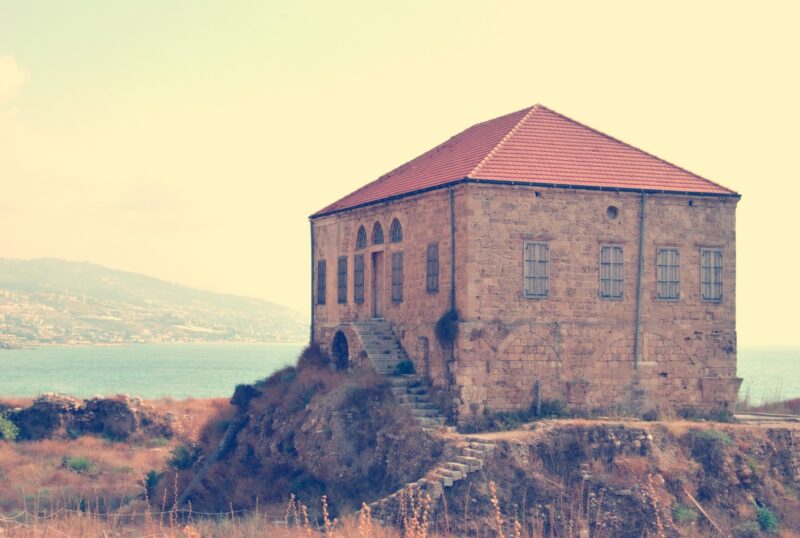On the Doorstep
that’s no doorstep.
it’s a pillar on the side.
yes
that’s what it is.
– Arun Kolatkar, The Doorstep
About an hour’s drive north of Beirut, along the highway snug between once snow-capped mountains and the sea, before Batroun, after Byblos, on a winding road to the right, a few minutes inland, there is a house.
White limestone, terracotta tiles on a steep, slanted roof. Once conifer green shutters, peeling now, shuttered off. Three-arched windows, high cooling ceilings you cannot see from outside. The doors are locked. They were not always. They never were in my grandfather’s house.
The house is older than my grandfather, older than his, probably. Older even than the modern state of Lebanon, maybe. There is no record of who built it, who lived in it before us, just as there will likely not be a record of us.
But for the record, once upon a time,
My grandfather had a house whose windows looked onto the sea, to the West. East, mountains flanked with olive trees. There was an orchard. Clementines, lemons. A patch for tomatoes, mint, parsley. The rooms had blue and white tiles on the floors. The doors were a dark, fir green, like the shutters. With thick brass handles and shiny, unused locks; the doors were always open.
To sun, sandy eastern winds, Mediterranean mist, chilled northern gusts that blew from Turkey, Russia, farther. To friends and strangers who became them. To wanderers who wandered on, or wandered in. Wandering dogs who were fed and thus stayed and were, though begrudgingly, welcome.
My grandfather’s house was no different from the others in that village. All doors were open in that place and time where people rose early, brewed coffee, and took their pots and cups to their doorsteps to drink.
The aroma preceded them out, and the cats. They sat down. Through other doors, more smells and faces. Conversations and cups. More cups were fetched from the kitchen. Hot bread; dried thyme and olive oil. Crumbs were scattered, to the delight of ants and birds, and the children who gathered to watch them.
Peas were shelled for the day, rolling off. The day rolled on to dusk. Dried sumac was ground into powder, dusting the air pink – cough -, tainting the crevices of the stone burgundy. Later, the broom, but not now. Now and into the night, on those doorsteps, anise tea and conversation.
Once upon a time. I remember such a time, before big words, big ideas put people in lonely little boxes. People lived in airy houses whose doorsteps were thresholds into their lives and out onto the lives of others. People took time to learn people’s first names and had time enough to use them. They had time to stop, sit down, and talk. We had time too, I remember.
White lace curtains through which white light flooded each room, even in winter. Decks of cards, worn corners. Ashtrays that by evening brimmed with the remnants of encounters. I remember entire summers of afternoons daydreamed away on the doorstep, whole libraries read. Pink lemonade and yellow cakes. The breeze and neighbors who came and went.
I don’t remember the door ever closed. I don’t recall locking it at the end of every August. I don’t remember leaving. I don’t remember the last time, the very last, or when it was, or if we knew. I don’t remember when we grew up and learned big words and became them.
Global, cosmopolitan sophisticates jetsetting to destinations too cold for open doors, too crowded for first names, too far for visits home. Workdays too long, time too little and, paradoxically, time zones too many to talk. Little boxes, really. Meanwhile, we lost time, we lost my grandfather, we lost more.
Once upon a time though, the other day actually, I drove by the old house. No, I drove to it, on a sunny day, for an hour, north from Beirut. I left the windows open, but locked the car. I walked up to the door, bolted, cracking, and sat on the doorstep, crumbling. I thought of you, and of thick coffee steaming from thimble-sized cups. Milk biscuits. A breeze blew. I thought I smelled a hint of parsley and mint. Or perhaps it was lemon.
